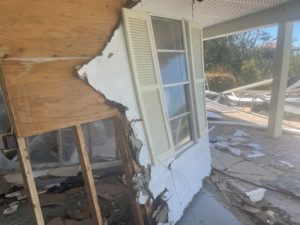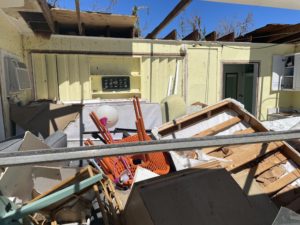It looks like the Florida legislature is about to pass a set of radical amendments that will deprive property owners in the Sunshine State of the power to enforce the laws that give them the right to be treated fairly by insurance companies…and with no requirement that premiums come down to compensate for the loss of that right.
Every Florida homeowner should be calling the Governor and their Assembly and Senate representatives to register their opposition and outrage. For more info, click here.
United Policyholders is a non-profit that’s in the business of helping people avoid and solve insurance related problems. We advocate for laws and public policies that hold insurers to their promises to indemnify their customers when they suffer losses. With the power and money dynamics that come into play when a disaster-impacted homeowner needs their for-profit insurer to come through, those laws are critically important. But they don’t enforce themselves.
Every day people from across the United States call and send us emails seeking help getting their claims paid. Most of them are in severe financial distress due to an insurer’s refusal to cover the costs of restoring their homes to a safe and liveable condition. Most are shocked by the excuses, delays, fine print limits, confusing math and hardball tactics insurers are now using.
Insurers denied one third of Hurricane Irma claims without payment, and so far have denied just under 1/3 of Hurricane Ian Claims. (Source: FLOIR) If your home was damaged or destroyed in a hurricane and your insurer refused to pay for needed repairs in full and on time – would you just roll over and take it? If this legislation goes through as is, that’s likely to be the only option for most people.
When people contact UP for help, we help them be their own best advocates and remind them that they’ve paid for coverage and good claim service and shouldn’t have to pay a lawyer or other professional to get it. The vast majority of people don’t want to hire a lawyer or initiate a lawsuit – they just want to be able to fix their homes with the insurance benefits they paid for. In almost every case, hiring an attorney and initiating a lawsuit is a last resort when all else has failed.
Most of the lawsuits insurers are complaining about are the result of their own failure to deliver the peace of mind and financial security they agreed to provide when they cashed people’s premium checks. The legal system filters out frivolous claims. Have their been abuses? Without question. Do they merit removing the most potent deterrent to insurers witholding repair funds owed? NO.
UP does our best to identify the laws, regulations, strategies and free government resources that give an individual leverage to get a powerful corporation to change course and pay a claim fairly. But at the end of the day, the ability to hire a competent lawyer and file a lawsuit is the most potent leverage available to individuals in today’s rough and tumble insurance ecosystem. In an ecosystem where consumers face high and multiple wind and roof deductibles, complicated math formulas, estimating tools designed to undervalue damage, “touchless” claim adjusting, unresponsive claim departments and having to deal with third party consultants instead of of adjusters employed by their insurer – the average person often doesn’t stand a chance unless they hire a lawyer.
But instead of doubling down on the penalties insurers face for not making good on their promises, or beefing up the consumer assistance and enforcement resources of the state agencies, the Florida legislature is on the brink of depriving their state’s residents of their primary leverage to remedy unfair treatment. Yes, a policyholder can file a complaint with the Division of Financial Services, but they don’t have the staffing and funding to be an effective substitute for the private attorneys who remedy individual disputes and enforce fair claim handling laws. That’s just a fact.
Florida’s latest Special Insurance Session bill (which piles on to what they’d already done earlier this year), will make it functionally impossible for most people to find a lawyer to take their case let alone take the personal financial risk of possibly having to pay an insurance companies legal bills if they lose. A radical undoing of a 100 year old law.
Another gem in the special session package is forcing policyholders into mandatory binding arbitration to resolve claim disputes. Again – the consumer is screwed from the get-go. Insurers control the process and have the ability to pay their experts by the hour – most consumers don’t.
And why? To reduce insurance rates – the proponents say. Then why not include a requirement that insurers reduce their rates within a reasonable period of time after the reforms take effect?
Speak UP Floridians!


